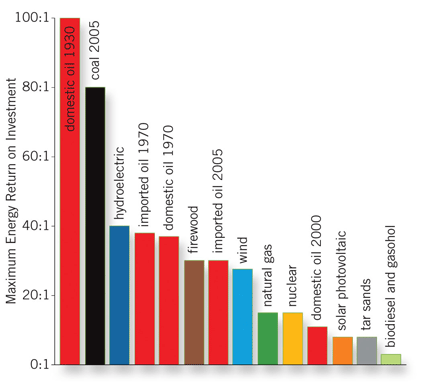made
for a happy day
Preparing for Transition?
Imagine discovering an energy source so versatile that it could power
90% of modern transportation, help in the production of 95% of industrial
goods, provide a three fold increase in agricultural crop yields and supply
our government (alongside gas) with 30% of its corporation tax receipts.
You just struck oil! But here's the rub. 100 years ago you only had to
puncture Texan ground to make oil burst forth. Today we're burning natural
gas to extract it from tar sands. The return on energy invested was once
100:1 - for tar sands it is closer to 2:1. As more and more energy is
required to extract oil, less will be available to feed economic growth.
The low price oil we've enjoyed for decades appears to be history.
The Transition Town Network has highlighted some of the challenges this
poses. It is working to build local resilience and it is not alone. Interest
in allotment plots, car sharing and renewable energy is growing. Sustrans
is encouraging us to walk, cycle and use public transport. People are
getting their homes better insulated - a sensible first step faced with
the prospect of rising heating costs. Are you prepared?
Ends | 13 Oct 2010 | The Leg
comment
| back to top |
thoughts
References:
90% of the world's transport relies on
oil
Oil is used in the production of 95% of
industrial goods
Oil and gas provide 30% of all UK corporation
tax receipts
In the US in 1930 the EROI for oil was
at least 100:1
Tar sands - investing 1 barrel to extract
2 barrels
For every 100 allotment plots, 59 people
are on a waiting list
Members of car sharing clubs around the
UK number 127,000
Sustrans makes smarter
travel choices possible
Since 2005, Transition Town groups
have sprung up across UK
Essential Reading:
A
Presidential Energy Policy by Michael C. Ruppert
Crude:
The Story of Oil by Sonia Shah
Sustainable Energy without the
Hot Air by David MacKay
Graphs:
 Graph: Today
it takes a lot more energy to extract hydrocarbons from the ground and
to engineer the devices that can convert sun, wind and water into electricity.
Feeding crops oil based fertilisers only to convert them into biofuel
delivers hardly any net energy gain.
Graph: Today
it takes a lot more energy to extract hydrocarbons from the ground and
to engineer the devices that can convert sun, wind and water into electricity.
Feeding crops oil based fertilisers only to convert them into biofuel
delivers hardly any net energy gain.
